Revised 30 September 2022
Accepted 27 January 2023
Available Online 14 March 2023
- DOI
- https://doi.org/10.55060/s.atssh.230306.032
- Keywords
- Teaching competition among the young teachers
Young teachers
Trade union
Promoting teaching by competition - Abstract
The teaching competition among the young teachers promotes the development of young teachers, which is an important fulcrum for trade unions in colleges and universities to assist the development of young teachers. This study conducted a questionnaire and interview survey on the cognition of and participation in the teaching competition by young teachers from S University in Shanghai, and made an empirical research on the influencing factors of young teachers' participation in the teaching competition and how trade unions assist the development of young teachers. Then, the motivation and influencing factors of young teachers participating in the teaching competition is explored, in order to provide suggestions for the trade unions to assist the development of young teachers.
- Copyright
- © 2023 The Authors. Published by Athena International Publishing B.V.
- Open Access
- This is an open access article distributed under the CC BY-NC 4.0 license (https://creativecommons.org/licenses/by-nc/4.0/).
1. INTRODUCTION
Young teachers are an important part of the teaching staff and the backbone of universities now and in the future. Young teachers are important objects of trade unions in colleges and universities. It is an important duty of the trade unions in colleges and universities to unite and lead young teachers to devote themselves to the educational cause of fostering character and civic virtue. The “teaching competition among the young teachers”, as a golden brand of trade union in colleges and universities serving the overall situation of education, is not only a platform for young teachers to hone their basic teaching skills, display teaching ability and improve their teaching ability, but also a concrete embodiment of the university image and teaching strength, and an important fulcrum for the trade union in colleges and universities to guide the development of young teachers.
Therefore, this study took the faculty of S University in Shanghai as the survey object and tried to present the cognition and attitude of young teachers from S University in Shanghai towards the “teaching competition” based on key points, and specifically explored the realistic path of college trade unions to assist development of young teachers by virtue of the “teaching competition among the young teachers” [1].
2. PROBLEM INVESTIGATION AND DESCRIPTION
This survey was mainly conducted in the form of a questionnaire, supplemented by interviews. The questionnaire was mainly designed on three categories of contents: “cognition and attitude towards the teaching competition among the young teachers”, “improvement of teaching ability” and “support of trade union”. The survey distinguished full-time teachers from administrators. A total of 126 questionnaires were sent to full-time teachers, 120 of which were recovered. 11 invalid questionnaires were removed, and 109 were effectively recovered, with an effective recovery rate of 87%.
In order to cover all the disciplines involved in the “teaching competition among the young teachers”, the respondents came from 10 departments of S University in Shanghai, including the engineering department, the arts and sciences department, the department of economics and management, the department of applied arts and design, the department of international exchange, the college of higher vocational technology (international), the sports department, the Marxism department, the engineering training center, and the art education center. The structural questionnaire in this survey included 19 questions, including 7 choice questions (single choice and multiple choice), 5 scale items, and 2 divergent blank filling questions in addition to basic information. Seven interviewees were randomly selected. Two small control groups, “teachers who did not participate in the competition” and “teachers who participated in the competition”, were set up. 12-15 questions were designed respectively, and relevant interviews were conducted on participation intention, lesson preparation process, participation evaluation, participation expectation and other aspects of the seven young teachers.
According to the survey results, a descriptive summary of the current situation of young teachers' cognition and attitude towards the “teaching competition” and the problems existing in the support of the trade union is as follows.
2.1. Young Teachers Had Higher Educational Background and Less Teaching Experience, and the Proportion of Young Female Teachers Was Higher
109 pieces of data were collected, among which master's degree accounted for 43.02% of the total; doctoral degree accounted for 50% of the total; postdoctoral students accounted for 6.98% of the total. Nearly 60% of the respondents had a doctor's degree or above. Among them, 73.62% of young teachers had 0-5 years of teaching experience; the proportion of teachers with 5-10 years of teaching experience was 13.95%; the proportion of young teachers with 10-15 years of teaching experience was 10.47%; and the proportion of those with more than 20 years of teaching experience was 2.32%. It could be seen that most young teachers had 0-5 years of teaching experience (Fig. 1).
According to the survey, it was found that the male and female proportion of young teachers were 43% and 57% respectively, and the proportion of young female teachers was slightly higher than that of young male teachers (Fig. 2).
2.2. Young Teachers' Understanding of the Teaching Competition Was at a Shallow Level, With Low Participation Rate and Weak Internal Motivation
UNESCO defines “youth” as people who are between 16-45 years old, and the World Health Organization also defines people who are under 44 years old as the “youth”. However, the competition age of the teaching competition among the young teachers in colleges and universities is limited to be under 40 years old. In order to make the survey results more objective and accurate, researchers excluded the questionnaire of young teachers over 40 years old, and only investigated the cognition and attitude of young teachers under 40 years old in S University.
Among the 109 valid questionnaires collected this time, the questionnaires of young teachers over 40 years old were removed, and there were 86 valid questionnaires. Among them, 71 young teachers had heard of the teaching competition accounting for 83% of the total; there were 15 young teachers who had never heard of the teaching competition accounting for 17% of the total (Fig. 3).
Among them, 51 teachers said that some teachers around them had participated in the teaching competition accounting for 72% of the total; 13 teachers said that there was no teacher around them participating in the teaching competition accounting for 18% of the total; and only 7 teachers had participated in the teaching competition accounting for 10% of the total (Fig. 4).
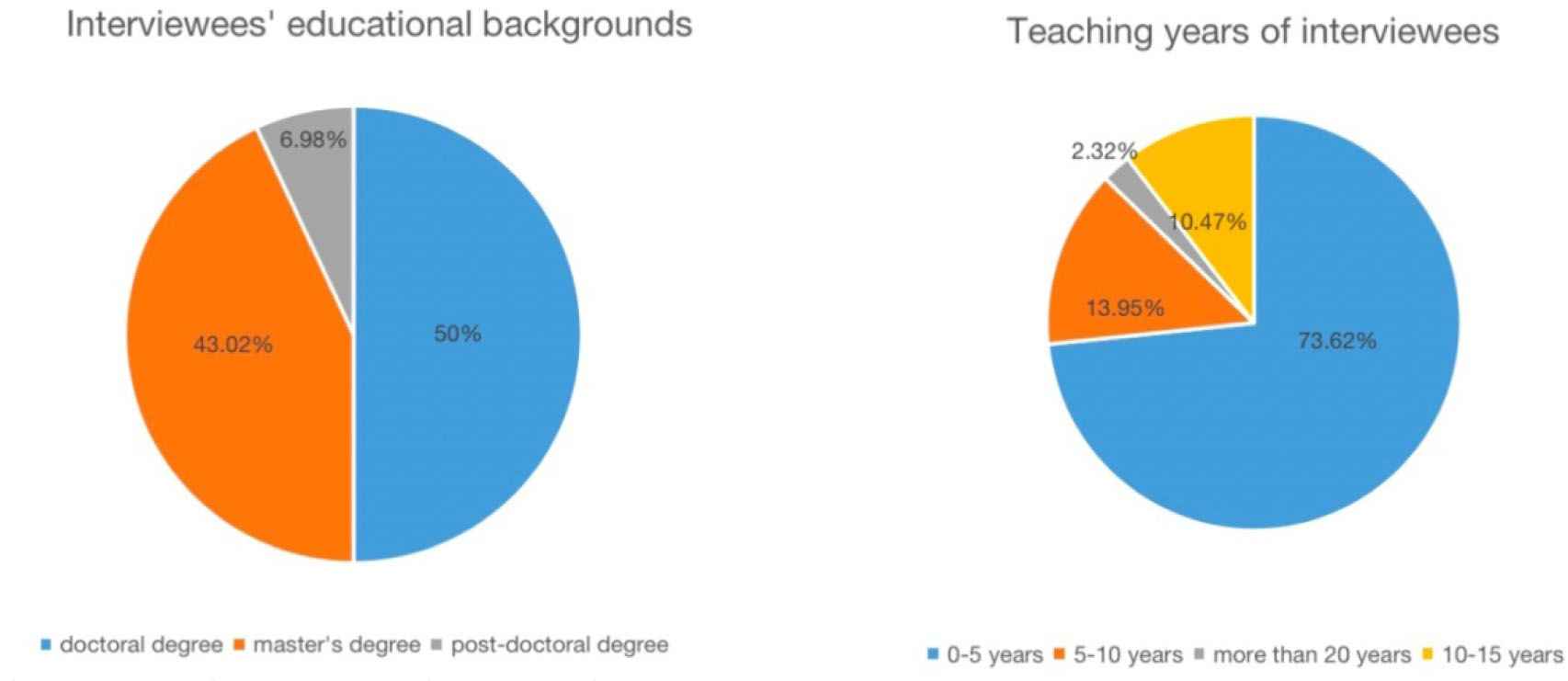
Interviewees' educational backgrounds (left) and teaching years (right).
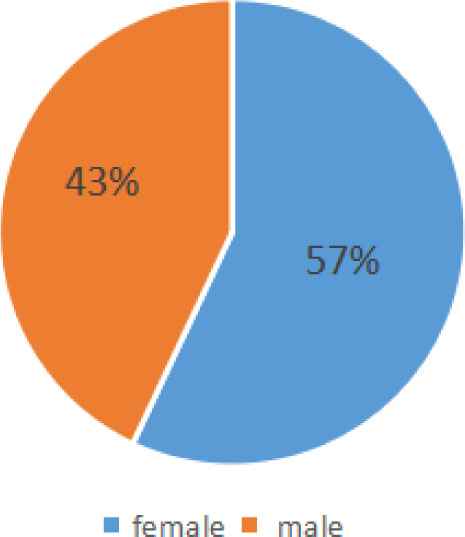
The gender of interviewees.
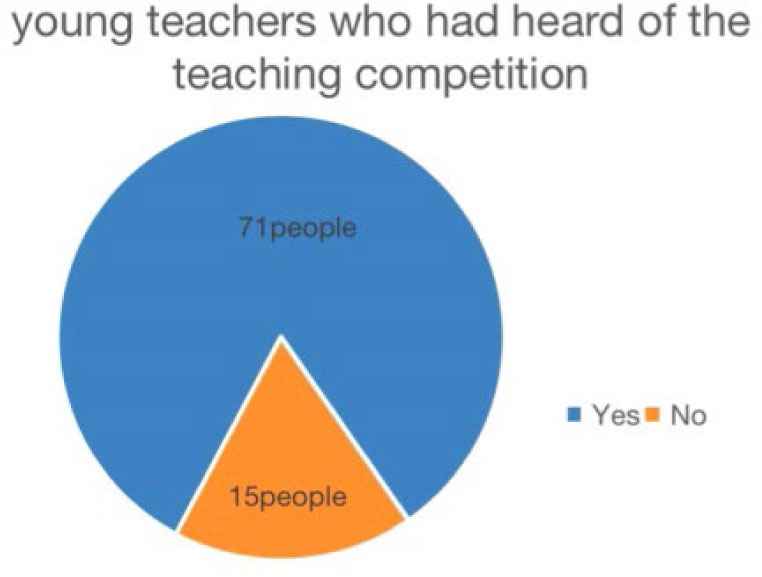
The proportion of young teachers who had heard of the teaching competition.
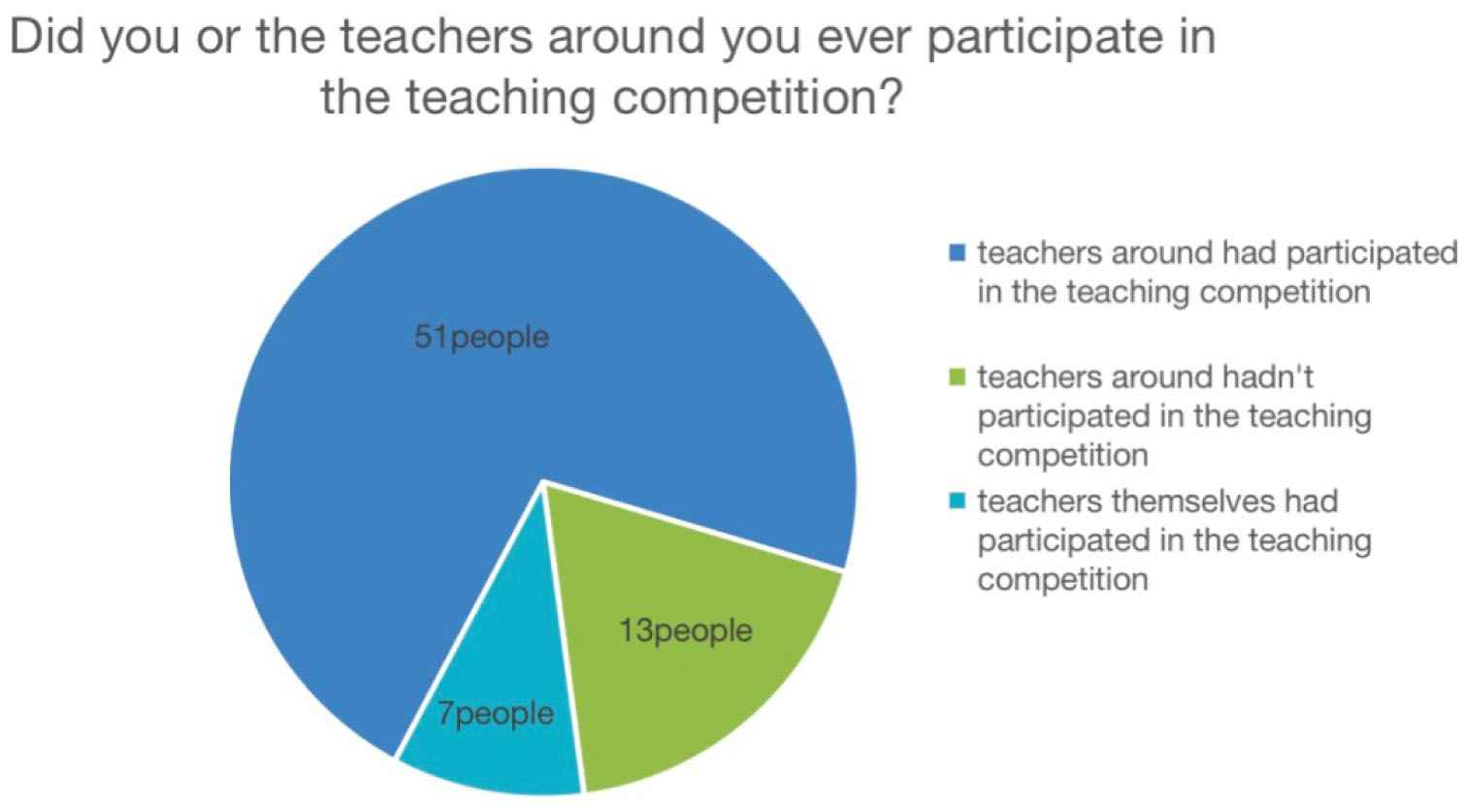
The proportion of teachers who had participated in the teaching competition.
When investigating the motivation of these seven contestants, researchers set six options, namely, obtaining honor, promoting professional title, economic reasons (bonus, etc.), personal ability improvement, obtaining competition experience and requirements of the college or department. In each option, researchers set five options representing the strong and weak degree: stronger, strong, medium strong, weak, weaker. (When calculating the competition motivation strength, a points system was adopted: stronger – 5 points, strong – 4 points, medium strong – 3 points, weak – 2 points, weaker – 1 point. The scores of the six options were counted. A high score meant a strong motivation, whereas a low score meant a weak motivation.) Among them, it was found that the option of “requirements of college or department” scored the highest, with a total of 30 points; there were 27 points for the option “personal ability improvement”; the scores of the options of “gaining competition experience” were the same as that of the option of “gaining honor”, namely, 24 points; there were 14 points for the “promotion of professional title”; and the lowest score was for the option of “economic reasons (obtaining bonus)”, namely, 8 points (Fig. 5).
2.3. Pressure of Scientific Research, Lack of Time and Energy, and Lack of Participation Training and Guidance Had Become the Main Obstacles for Young Teachers to Participate in the Teaching Competition, and the Potential Enthusiasm of Young Teachers to Participate in the Teaching Competition Was Obvious
When studying the difficulties encountered by the seven competitors in the competition, it was found that the option of “scientific research pressure” scored 29 points, which was the highest; there were 28 points for “insufficient working time and energy”; there were 26 points for “lack of training and guidance”; there were 19 points for “enthusiasm for the competition”; and there were 18 points for the option of “family and life troubles” (Fig. 6).
The other 79 young teachers who did not participate in the competition also estimated the difficulties they might face in participating in the teaching competition. The data showed that the option of “scientific research pressure” still scored the highest with a total of 322 points; “insufficient working time and energy” ranked second with 303 points; the “lack of training and guidance for participation” scored 289 points; “family and life troubles” scored 244 points; and “enthusiasm for the competition” scored the least with 231 points (Fig. 7).
It could be seen from this that the actual difficulties encountered by the teachers who participated in the competition and those who did not participate were basically the same, that is, the pressure on scientific research was high, the working time and energy were insufficient, and the participation training and guidance were lacking. In particular, the great pressure of scientific research was considered as the biggest obstacle for young teachers to participate in the teaching competition. However, the teachers who didn't participate in the competition believed that the difficulties in life were more stressful than that of the young teachers who actually participate in the competition, and the difficulty ranked fourth among the difficulties in the competition. In addition, among the teachers who did not participate in the competition, “their enthusiasm for the competition” ranked last among the difficulties in the competition, showing that among the young teachers who did not participate in the competition, the potential enthusiasm for the competition was more obvious.
2.4. There Was High Demand for Attention and Support of the Trade Union in the Teaching Competition, and the Proportion of Demand for “Competition Guidance” Was the Highest
When studying the overall needs of young teachers for the support of the trade union of S University in the teaching competition, a points system was adopted: stronger – 5 points, strong – 4 points, medium strong – 3 points, weak – 2 points, weaker – 1 point. The overall score was divided into 6 intervals: weaker {1–3}, weak {4–6}, medium {7–9}, strong {10–12}, stronger {13–15}. After counting the scores of each interviewee, the overall need of the interviewee for the support of the trade union in the teaching competition could be obtained.
Among them, 21 people scored in the range {13–15} (stronger) accounting for 24.4% of the total; 35 people scored in the range {10–12} (strong) accounting for 40.7% of the total; 23 people scored in the range {7–9} (medium strong) accounting for 26.7% of the total; 3 people scored in the range {4–6} (weak) accounting for 4.7% of the total; 0 person scored in the range {1–3} (weaker) accounting for 0% of the total; and 2 people scored in the zero range accounting for 3.5% of the total (Fig. 8).
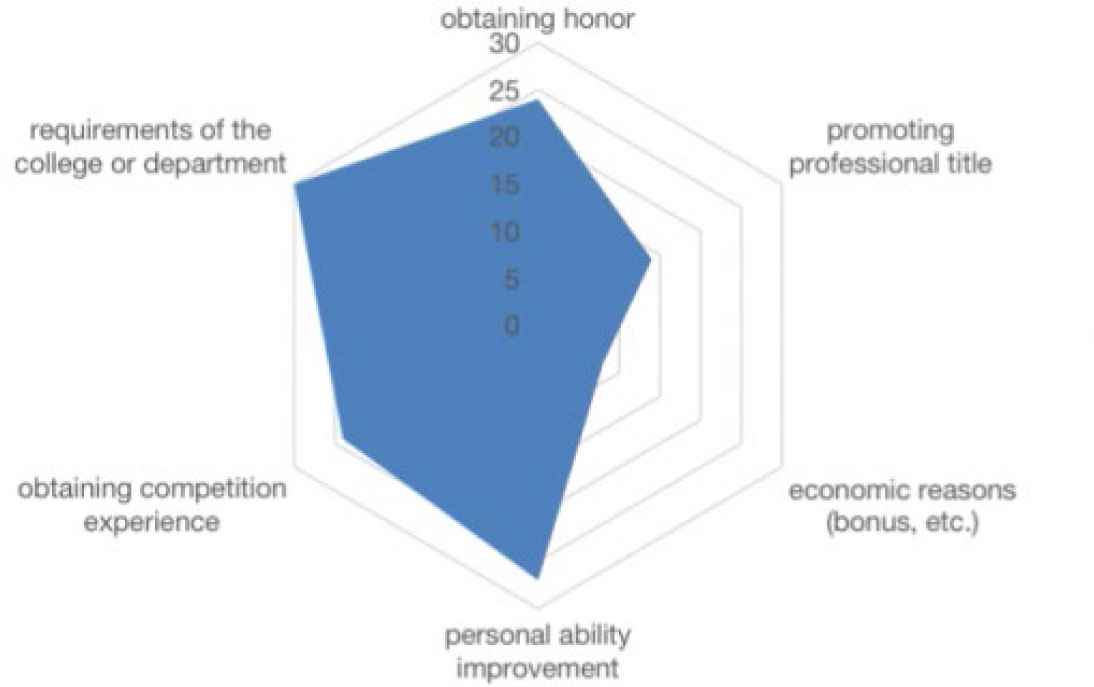
Competition motivation.
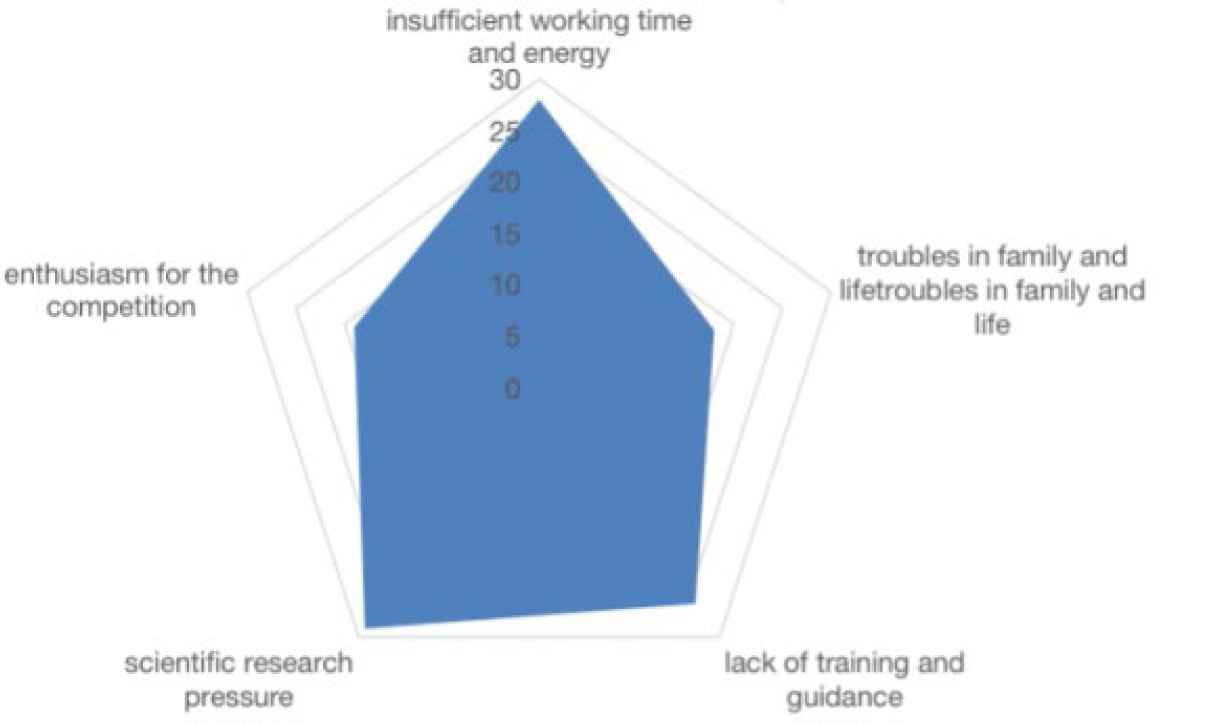
Difficulties encountered in the teaching competition.
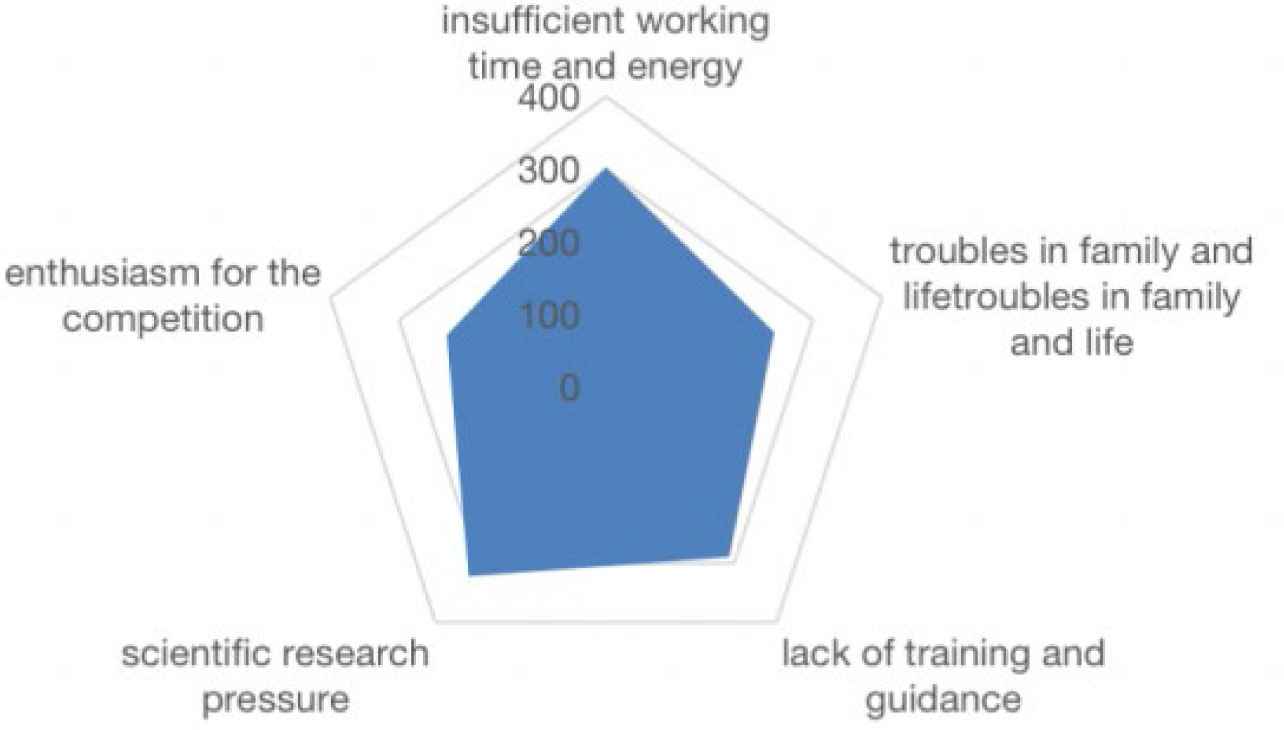
Views of teachers who hadn't participated in the teaching competition on difficulties in the teaching competition.
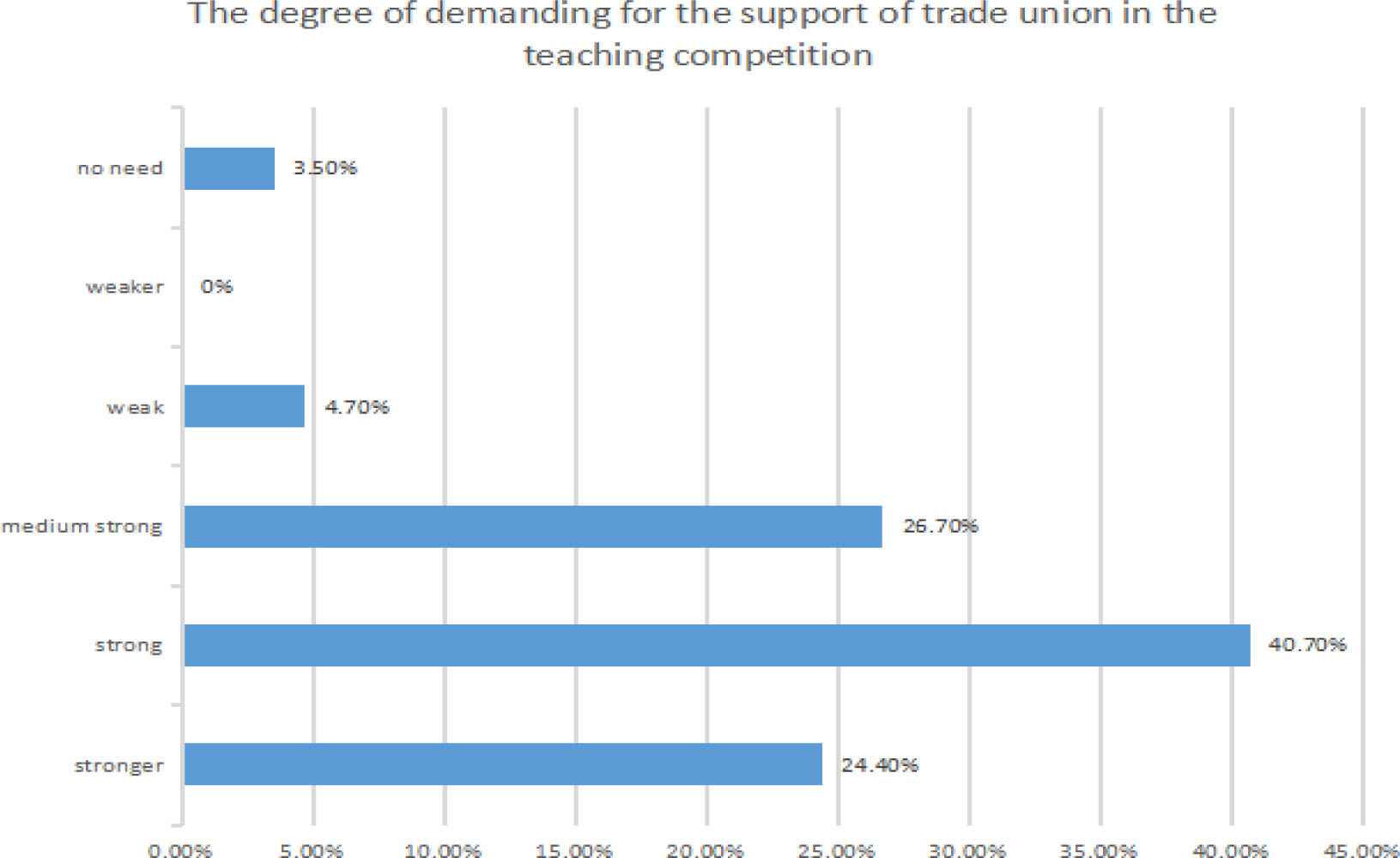
The degree of demanding for the support of the trade union in the teaching competition.
Among them, the option of “obtaining competition guidance” scored the highest (348 points) accounting for 37% of the total; the option of “economic support” scored the second (337 points) accounting for 36% of the total; and the option of “psychological counseling” scored the lowest (259 points) accounting for 27% of the total (Fig. 9).
According to the open topic feedback on relevant issues effectively recovered, 34 young teachers gave their own views and suggestions, which could be summarized and classified into the following six aspects: expanding the scope of disciplines and carrying out classified competitions, providing excellent training and observation, expanding publicity, incorporating into the professional title evaluation system; combining with the actual teaching situation, enhancing the applicability, and giving advance notice and sufficient time for preparation.
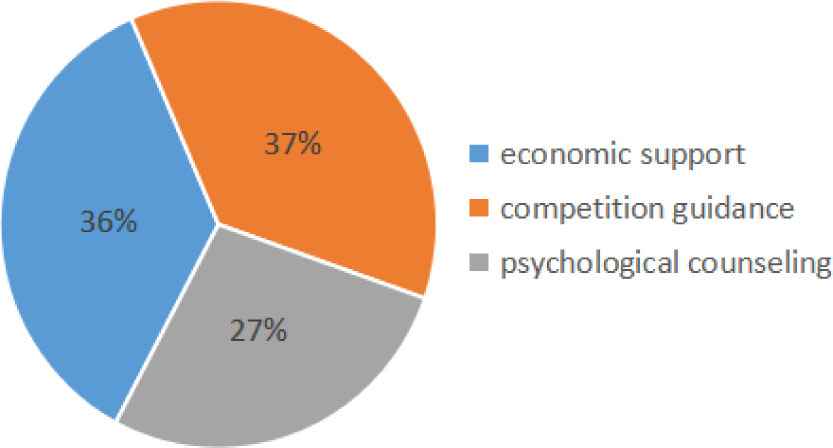
Types of support provided by the trade union.
Among them, 11 people suggested “providing excellent training and observation”, accounting for 31% of the total; 8 people suggested “expanding publicity”, accounting for 22% of the total; 5 people suggested “incorporating into the professional title evaluation system”, accounting for 14% of the total; 6 people suggested “combining with the actual teaching situation and enhancing the applicability”, accounting for 17% of the total; 4 people suggested “expanding the scope of disciplines and conducting classified competitions”, accounting for 11% of the total; 2 people suggested “giving notice and enough time for preparation in advance”, accounting for 5% of the total (Fig. 10).
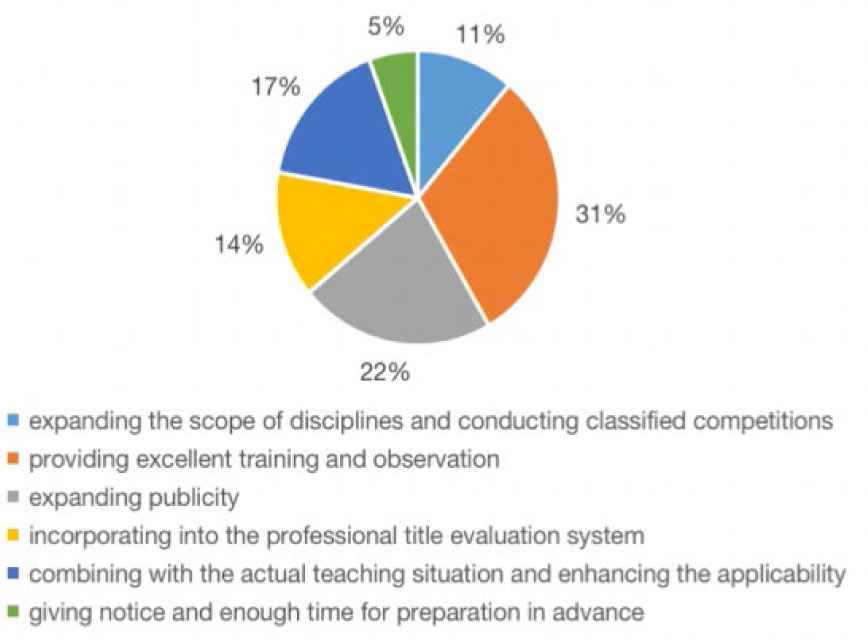
Suggestion for the teaching competition.
According to the survey on participation intention after the trade union provided help and support, 31 people chose to “consider” participation in the competition accounting for 36%; there were 22 participants who chose “may consider participation” accounting for 25.6%; and the proportion of these two items exceeded 60%. A total of 21 people chose to “consider cautiously” accounting for 24.1%; there were 5 participants who chose “not be willing to consider participation” accounting for 5.8%; and there were 7 participants who chose “not consider participation” accounting for 8.7% (Fig. 11).

Whether to participate in the teaching competition with the support of trade union.
2.5. Problem Analysis
Viewing the above survey results, young teachers from S University in Shanghai still had a superficial understanding of the teaching competition. Young teachers had high educational background and short teaching experience, the proportion of young female teachers was slightly higher, and internal motivation for participation was not strong. At the same time, there were objective and subjective factors affecting young teachers' attention and participation in teaching competitions, such as high scientific research pressure, insufficient time and energy, and lack of participation training and guidance. In addition, young teachers had obvious potential positive psychology and sense of attempt towards the teaching competition, and they wanted more attention and support from the trade unions in the teaching competition. In view of the above, researchers would further sort out and analyze the root causes in combination with the interviews with seven young teachers from S University in Shanghai (Table 1).
| Serial Number | Gender | Age | Education Background | Teaching Experience (Years) | Whether to Participate in Teaching Competition Among Young Teachers (School Level / Municipal Level) |
|---|---|---|---|---|---|
| 1 | Male | 34 | Doctoral degree | 3 | Yes |
| 2 | Female | 29 | Master's degree | 3 | No |
| 3 | Female | 30 | Doctoral degree | 1 | No |
| 4 | Female | 26 | Master's degree | 1 | No |
| 5 | Female | 39 | Master's degree | 13 | Participate in teaching competition at the school level and municipal level |
| 6 | Male | 33 | Doctoral degree | 3 | Participate in teaching competition at the school level and municipal level |
| 7 | Male | 38 | Doctoral degree | 8 | Participate in teaching competition at the school level and municipal level |
Basic information list of interviewees.
2.6. Lack of Participation Motivation due to Vague Cognition of the “Teaching Competition”
The teaching competition among young college teachers, referred to as the “teaching competition”, is a competition of young college teachers' teaching skills. Most young teachers have high academic qualifications and short teaching experience, and some have just completed the transformation from students to teachers. Therefore, there is a general lack of confidence in teaching skills of young teachers. For example, interviewee No. 3 said: “I have heard of the teaching competition, but I have never thought of participating in it. There are two reasons for not participating in the competition. One is that as a new teacher, I don't have the strength. The other is that I haven't seen the relevant registration notice.” When asked if they knew what the teaching competition was about, interviewee No. 6 said: “I participated in the school competition according to what I taught in class, but I didn't know what the gold content and difficulty of the teaching competition was until I participated in the municipal competition. And I thought it was a lecture competition before.” Among the seven young teachers interviewed, 4 interviewees thought that the competition was on the teaching level, and 2 interviewees said that teachers should pay attention to the height of the lecture and the fun of the lecture. And then, students would love listening to the lecture.
The teaching competition can be said to be a review of young teachers' teaching ability and an evaluation of their teaching quality. It is no exaggeration to say that if young teachers are compared to “professional players” in teaching, the teaching competition is the “National Games” of higher education [2]. Through investigation, it was found that the young teachers of S University didn't know much about the teaching competition and their cognition was vague. The reasons were as follows. First, S University didn't carry out much publicity about the teaching competition, and there was a piece of notice or news; second, most young teachers couldn't evaluate their teaching skills, and had not yet given birth to the idea of going to the competition. They lacked the motivation to take the initiative to pay attention to and understand the teaching competition. As a result, young teachers selectively ignored the relevant information of the teaching competition, leading to the lack of self-motivation of young teachers from S University to participate in the teaching competition.
2.7. Lack of Confidence in “Participating in the Teaching Competition” due to Limited Competition Skills
As the most representative college teaching competition, the teaching competition among the young teachers emphasizes the participation universality and the comprehensiveness of ability inspection. It is neither an isolated “king content” nor a single “supreme form”. It is a systematic competition that takes moral cultivation as the fundamental task and aims to “teach a good course” to temper young teachers' basic teaching skills. Young teachers are fresh in the workplace and full of energy. Most of them have strong work enthusiasm and ambition. The teaching competition is just an important platform for guiding and refining young teachers' teaching ability [3]. Referring to the teaching competition, interviewee No. 5 said: “I have made great progress by participating in the teaching competition. If I did not participate in municipal competition, my teaching level would be limited all my life.” Interviewee No. 6 mentioned: “The teaching competition has brought me changes that I could not imagine before. It is really hard, but it has made my teaching ability a new one.”
There is no doubt that the teaching competition can promote young teachers' teaching ability. However, most young teachers are often unable to compete comprehensively and systematically due to the limitations of their competition skills. On the one hand, young teachers have a strong sense of honor, and they all hope to show their best teaching level in order to be recognized and praised. However, most young teachers are not long in teaching experience and accumulation is limited. If there is no certain accumulation and targeted preparation training, it is difficult for young teachers to “promote” in the short term. They are either tired of the difficult and complicated preparation process or afraid of the cruel competition link, which easily leads to doubts about the value and significance of the competition, and reduces the confidence of young teachers in the competition. On the other hand, young teachers who lack the support for the competition preparation are easy to lose their combat effectiveness in confusion, hard work and loneliness. As interviewee No. 7 said, “In addition to lectures, there are many parts to be designed and written in the teaching competition. Without special training and study, I don't know methods to write, contents, or the standards. I'm really confused. I need to cheer myself up constantly, otherwise it's really hard to continue.” Interviewee No. 5 said: “I don't have much training at ordinary times, and I don't know what my problems are and how to improve them. It is painful to know that I have been repeating at the bottom, and it is difficult to break through by personal strength.” It can be seen that in the teaching competition, personal subjective efforts rank the first, and perfect preparation support is also an indispensable and important factor. The lack of preparation guidance leads to the limitation of teaching skills, which can easily dilute young teachers' confidence in the competition.
2.8. Value Confusion of “Participating in the Teaching Competition” Leads to Lack of Inheritance Intention
The teaching competition is a set of “combined boxing” of education concept, teaching content, teaching methods and teaching skills, with the concepts of “making a good lecture”, and inheriting the spirit of “loving the job” and “fostering character and civic virtue”. Through questionnaires and interviews, it is found that young teachers lack sufficient understanding of the necessity and importance of the teaching competition, as well as profound understanding of its value and significance. This phenomenon also reflects the lack of mobilization, publicity and guidance for young teachers [4]. In the process of preparing for the competition, young teachers often encounter the mismatch between ideal and reality. Interviewee No. 2 said: “It took a lot of time to prepare for the teaching competition, and I felt anxious and had no time. I originally went to the competition with a learning attitude and wanted to see how other teachers taught and how my own class was viewed by the professional judges. But I didn't expect that in the process of preparing for the competition, I spent so much time and energy, and then went to ‘crumble’. I knew that I could not win the prize with my current strength, but I still had to do so many things. I really felt that I was digging a hole and jumping in it. And it's due to the fact that my viewing pattern is not big enough.” This anxiety can also be generally felt by other young teachers. Even interviewee No. 5, the “young teachers” with 13 years of teaching experience, also had the same feeling: “When preparing for the competition, I often had self-doubt and self-torture. Why did I want to participate in the competition? And this question always hovered in my mind. There was always a feeling of being unprepared. I couldn't sleep every day. I really felt like I hadn't finished my homework in my dreams. I was so worried that I wanted to cry.” It can be seen that along with the gap between expectation and reality, the value confusion caused by vague cognition and limited skills leads to young teachers' question about the significance of participating in the teaching competition, and young teachers will have self-doubt and psychological obstacles. Even after the competition, young teachers were not willing to take the initiative to mention or analyze the details of the competition with people around them. “The results were normal, and I didn't want to say much,” said interviewee No. 6, “People don't understand that. After all, those who hadn't participated wouldn't know what they had gone through in this process. Everyone is also very busy under great pressure.” Interviewee No. 1 also said: “When people see that you have put so much effort into it, it seems that nothing has been achieved. At most, they think that you work very hard.” “It's not worth talking about the demonstration. I feel I can't attract everyone to join me.” It can be seen that the value confusion caused by the vague cognition and limited skills of the teaching competition can easily break the original intention and confidence of young teachers in the competition. It can not only play a role in the demonstration, but also undermine the inheritance will of young teachers, thus contributing to the resistance of the next round of publicity and mobilization, forming a series of dead cycles, and ultimately resulting in the deviation and inheritance resistance of young teachers to the spirit of the teaching competition.
3. COUNTERMEASURES
Based on the above analysis, it was found that the young teachers from S University were obviously passive in their cognition and attitude towards the teaching competition, and they also showed a contradictory tendency of “being unable to do what one hopes to do” in the interview. This is due to the self-driven suspension caused by young teachers' vague cognition, skill limitations and value confusion of the teaching competition, which further affects the effective linkage between objective factors and subjective factors. Researchers believe that to assist the development of young teachers, the trade unions in colleges and universities should focus on the youth education competition, closely pay attention to young teachers' career development demands, play an important role in guiding and serving teachers, and highlight the role of trade unions in building morality and cultivating people.
3.1. Strengthening the Brand Awareness of the Teaching Competition and Telling the Story of the Teaching Competition
As an important stage to show teaching ability and test teaching achievements, the teaching competition has become a characteristic brand activity in the field of education. In view of the current situation that young teachers have a vague understanding of the “teaching competition”, the trade union of colleges and universities can strengthen young teachers' understanding of the teaching competition by expanding its multi-dimensional publicity. To be specific, the following approaches can be taken. First, it is suggested to strengthen the interpretation and popularization, clarify young teachers' cognitive misconceptions about the “teaching competition”, guide young teachers to fully understand the teaching concept and evaluation criteria of the “teaching competition”, and guide young teachers to realize that the teaching competition is not a single competition, but an incentive and reminder, and an important witness of growth and improvement. The second is to tell the brand story of the teaching competition, especially the “story behind the competition” and “story of growth” of young teachers participating in the competition. It requires not only a “story of success”, but also a “story of failure”. The story explains the spirit of the teaching competition, drives and stimulates young teachers' understanding and resonance of the teaching competition, and expands the influence and appeal of the teaching competition among young teachers.
3.2. Activating the System Linkage of the Teaching Competition and Improving the Competition Training Mechanism
As the “decathlon” of young teachers in the teaching field, the teaching level is an important manifestation of the soft power of colleges and universities. In view of the lack of confidence of young teachers due to their limited skills in the competition, the trade union of colleges and universities can give play to the characteristics of the extensive contact, seize the key to the problem, and build a relevant training platform with the Academic Affairs Office, Graduate School, Personnel Office, Publicity Department and other departments to assist the development of young teachers. The specific path is as follows. On the one hand, the teaching training and competition of young teachers can be fully covered through the support of school system policies and characteristic activities of trade unions, forming a competition training mode of “department level – university level – city level” and “pre-competition training – in-competition review –post-competition summary – demonstration and promotion” [5]. On the other hand, the trade union of colleges and universities can raise resources to provide personalized and all-round training guidance for potential young teachers to participate in the teaching competition, cultivate seed players, create a teaching pioneer, and replicate the experience of the competition. More importantly, by strengthening the linkage with relevant departments, the universities, college leaders and functional departments can fully understand the current teaching situation of young teachers. The teaching level presented by them can provide reliable materials and basis for the school to formulate targeted teacher training plans and policies in the future, making young teachers deeply feel that participating in the teaching competition is not “fighting alone”, but a strong support system to actively help young teachers achieve transformation from “standing on the platform” to “standing firmly on the platform” and “standing well on the platform”.
3.3. Promoting Incentive Upgrading of the Teaching Competition and Guiding the Positive Inheritance of the Competition
As the most representative teaching competition in colleges and universities, the teaching competition guides young teachers to actively participate in curriculum teaching through the incentive mechanism. In view of the current situation that the value of the “teaching competition” is vague, the trade union of colleges and universities can guide the positive inheritance of the teaching competition by promoting the incentive upgrade. The specific path is as follows. First, it is suggested to give play to the important function of trade unions in guiding and serving teachers, actively create an atmosphere of humanistic care, optimize the way to support young teachers' participation, alleviate young teachers' anxiety and resistance to the teaching competition through psychological counseling, and guide young teachers to jump out of cognitive errors and practice basic teaching skills. Secondly, it is required to take the lead in promoting the enrichment and upgrading of the award mechanism of the teaching competition, increase the incentive intensity, broaden the scope of the award, and increase the rating weight of the teaching competition in terms of performance assessment, professional title evaluation, honor awarding, etc., so that the teaching competition becomes the “apple” that young teachers can “jump and get” in their hearts, and more young teachers are willing to participate in the teaching competition and are willing to inherit the spirit of teaching competition. Thirdly, it is necessary to give full play to the strong demonstration of the teaching competition, widely publicize and promote the achievements of the teaching competition, form a publicity loop with the brand story of the teaching competition, and help more young teachers grow from novices to qualified and excellent teachers of higher education in the inheritance of the teaching competition.
4. CONCLUSION
The teaching competition is an important fulcrum to promote young teachers from recreational teaching to good teaching. The trade unions in colleges and universities can give full play to their functional advantages, break through the stereotype of “cultural and sports trade unions” and “welfare trade unions”, take the teaching competition as a starting point, promote systematic linkage, and assist the development of young teachers rapidly [6]. At the same time, young teachers can also use the “teaching competition” as a competitive platform to benchmark curriculum teaching with standards of the teaching competition, hone teaching skills, improve teaching level, learn to swim, learn to teach in the “teaching competition”, and understand the charm of teaching.
REFERENCES
Cite This Article

TY - CONF AU - Lu Wang AU - Xinyu Chen AU - Yiwen Lu AU - Lijuan Ran PY - 2023 DA - 2023/03/14 TI - Study on the Realistic Path of College Trade Unions to Assist the Development of Young Teachers: Taking the “Teaching Competition Among the Young Teachers” of S University in Shanghai as an Example BT - Proceedings of the 3rd International Conference on Education Studies: Experience and Innovation (ICESEI 2022) PB - Athena Publishing SP - 195 EP - 205 SN - 2949-8937 UR - https://doi.org/10.55060/s.atssh.230306.032 DO - https://doi.org/10.55060/s.atssh.230306.032 ID - Wang2023 ER -









